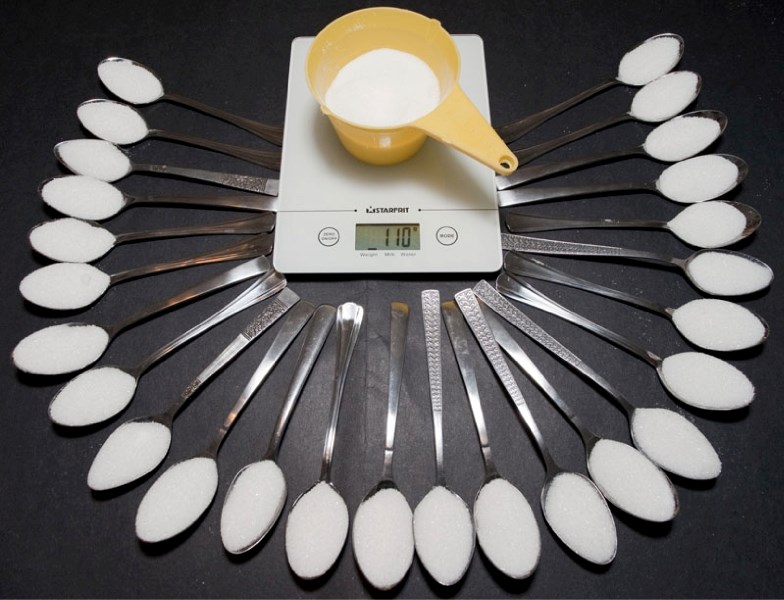Do Canadians eat too much sugar? That depends — is 26 spoonfuls a lot?
A new Statistics Canada study published this week suggests that most Canadians eat about 110 grams of sugar a day. That works out to about 26 teaspoons or three cans of soda.
Canadians get about 21 per cent of their daily energy (in calories) from sugar, says Kellie Langlois, lead author on the study. About 35 per cent of this comes from "other" foods such as candy and soda, with fruit and vegetables accounting for 31 per cent.
This isn't necessarily a big problem, says Karol Sekulic, a dietitian with Alberta Health Services. This study suggests that all but nine of those teaspoons of sugar come from natural sources like fruits and vegetables, which are slower to digest and are good for your health.
"In the grand scheme, it's not that big of a deal," Sekulic said.
Sugar everywhere
The study was part of the 2004 Canadian Community Health Survey, Langlois says. In it, some 34,400 Canadians aged one and up were asked to report everything they ate during the previous 24 hours. Researchers then used nutrition files to calculate the sugar consumed in those foods.
The study found that teenaged boys aged 14 to 18 ate the most sugar of any group, averaging 41 teaspoons a day. Women over 71 were the least sugary, gobbling a mere 20 teaspoons a day.
Sekulic notes that these stats are for all sources of sugar, natural and added, as the study was not able to distinguish between the two. Natural sugars, found in fruit, are thought to be better for you as they take longer to digest. Added sugars, found in foods like soda, are thought to displace other nutrients and act as empty calories.
Twenty-one per cent might sound like a lot, Langlois says, but it's on par with what most other nations eat in sugar per day.
"There's no real consensus on recommendations with sugar," she notes, and most focus on added sugar rather than all sugar.
The Institute of Medicine of the National Academies (an influential U.S. health policy group) recommends no more than 25 per cent of one's calories come from added sugar, while the World Health Organization sets the limit at 10 per cent.
"What's interesting is when you look at where these sugars come from," Sekulic said.
Kids aged one to eight get 35 per cent of their daily sugar from healthier sources like milk and juice, the study notes, with soda and fruit drinks accounting for just 10 per cent. This flips once they hit ages nine to 18 — milk and juice fall to 23 per cent of sugar while soda and fruit drinks jump to 21 per cent.
This is troubling, Sekulic says, as it suggests that soda is displacing milk during those critical years of bone formation.
"You're basically getting extra calories and not a lot of nutrients," she says, and could get weaker bones.
Healthier eating
Eating lots of sugar can cause cavities, Sekulic says, and might make you obese. Researchers can't say that sugar causes obesity, but have found that people who drink more sugary beverages tend to be more obese.
Sugar and calories are only half of the obesity problem, notes Jeff Johnson, St. Albert resident and the Canada Research Chair in diabetes health outcomes at the University of Alberta.
"Lack of physical activity combined with high calories, whether sugar or not, will both contribute to obesity," he said.
Sugar consumption does not cause diabetes, he adds, but obesity is associated with some forms of it.
Anyone worried about their sugar intake should start reading nutrition labels, Sekulic says, which list sugar content. The World Health Organization's sugar limit works out to about 12 teaspoons of added sugar a day, which sounds like a lot until you realize a can of pop has 10.
"If you're eating a granola bar and a cookie and you have a double-double, it can add up quickly," she said.
The study is available at statcan.gc.ca.




